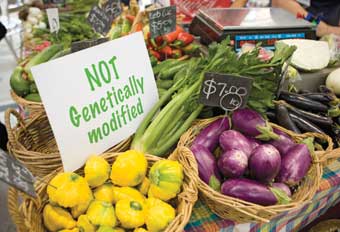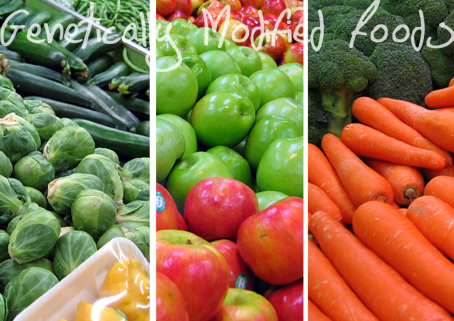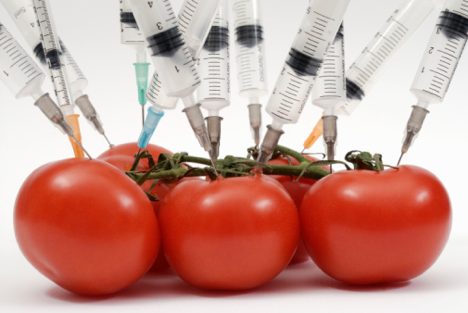Genetically Modified Foods are produced from genetically modified organism
(GMO).GMO are produced by changing their DNA with the help of RECOMBINENT
DNA TECHNIQUE. Generic materials of the two or more crops will be mixed.
When each of the genes of the particular crops has been identified, they are
then separated in science lab. These genes then cloned and injected into the
sequence of genes embryonic form of the recipient crop. Finally the seed of the
modified crop is planted.
Purpose is faster growth, resistance for pathogens, production of extra
nutrient, to develop anti-herbicides, etc. in plants. It is also to develop
such species which produce extra nutrients compared to traditional species, for
example, Rice species has developed which has sufficient vitamin A. GM food has
the quality to achieve food security.
ADVANTAGE:-
1- Less pesticide is needed to be used due to insect pest resistant
plants.
2- More economically friendly as pesticides do not mix into
air, soil & water. Their production hazards to the environment also
decrease.
3- Due to the reduced use of pesticides it decreases the
costs of growing and farming.
4-
Higher crop yields.
5- Farmers get more income, which they could spend on such
thing as, for example, the education of their children.
6-
Reduction of sickness and illness, as GMO crops are more nutritious.
People and children can get much vitamins and minerals.
7-
Reduction of world starvation due to increased
production.
8-
Decrease in food prices due to lower costs and higher
yields. As people in developing countries are spending over half to their income
on food alone, lower food price means an automatic reduction of poverty.
9- Development of new kinds of crops that can be grown at
extreme climates (dry & freezing environments), for example, scientist developed
a type of tomato that grows in salty soil.
DISADVANTAGE:-
1-
The safety of such products is not verified yet.
2-
It could raise new allergy outbreaks in humans.
3- A study in 2008 showed that feeding mice, engineered food
for 30 days caused an immune reaction and altered the number of cells that
regulated the immune functions in the body.
4- The effect of genetic food engineering could be
irreversible.
5- The plants that are genetically modified may become more
prevalent, choking other plants and causing native plants to die off.
IN WORLD CONTEXT:-
- As of 2013, roughly 85% of corns, 91% of soya beans
and 88% of cotton produced in the United States are genetically modified. A
large percentage of GM maize grown in the US is now used in industrial
scale biofuels subsidized by the US Govt.
- Large quantities of GM soya and maize are imported
into Europe, including Britain, as animal feed.
- Only two crops have been approved for commercial
growing in the European Union. One is BT maize and other is potato.
- As of 2011, 11 different transgenic crops were grown commercially on 395 million acres in 29 countries such as U.S.A, Brazil, Argentina, Paraguay, India, China, Australia and other countries.

-
IN INDIA CONTEXT:-
In India only one BT crops is produced that is BT cotton. After the ban on
BT Brinjal, has not been produced any GM foods. Although research and
development are going on in the public and private institution for transgenic
crops. Besides cotton, genetic engineering experiments are being conducted on
Maize, Sugarcane, Rice, Brinjal, Tomato, Potato & medical plants.
Experiments are also underway on several species of fish. They are also
doing research about its disadvantage and trying to reduce it. For Independent regulation,
"NATIONAL BIO-TECHNOLOGY REGULATORY AUTHORITY" (NBRA) has presented “NATIONAL BIO-TECHNOLOGY REGULATORY AUTHORITY"(NBRA)
Bill in Parliament. This NBRA will regulate the research, manufacturing and
import of transgenic crops.
CONCLUSION:-
 Thus according to me, in
India, BT crops are very beneficial for us. First of all we can achieve food
security by it. Our farmer’s condition will improve; economically also, this is
a good source of income. Since India is developing country and the main problem
in our country is poverty, hunger, malnutrition etc. By introducing BT crops
all things can be reduced. NBRA bill has been presented in Parliament
and we hope that it will be passed soon. After this, there will be an
independent regulator who will confirm that the BT crops drawbacks are not
going to affect the farmers. He will also assist in reporting time to time and
our scientists should try to reduce its drawback.
Thus according to me, in
India, BT crops are very beneficial for us. First of all we can achieve food
security by it. Our farmer’s condition will improve; economically also, this is
a good source of income. Since India is developing country and the main problem
in our country is poverty, hunger, malnutrition etc. By introducing BT crops
all things can be reduced. NBRA bill has been presented in Parliament
and we hope that it will be passed soon. After this, there will be an
independent regulator who will confirm that the BT crops drawbacks are not
going to affect the farmers. He will also assist in reporting time to time and
our scientists should try to reduce its drawback.
What do you think about GM Foods? Is this good or bad for
health and in different aspects?
What should be done to increase the quantity and quality
in agriculture especially in India and on world level?
Please comment your views and opinions here…
(Written by co-host Sumbul Rizvi of the event Group Discussion for UPSC CSE (Daily 9PM to 11PM) of the group Mission Mussoorie UPSC Civil Services based up on daily discussions. Please join and give your valuable views)
Follow @SocioCosmo













TheseGM should not be encouraged by knowing disadvantages 2,3,4 & 5.Cultivation of these crops leads untreatable health problems .
ReplyDeleteDisadvantages 2345 are life threatening which may bring changes in mankind so these not encouraged .....if you want to continue invent solutions for 2345 .
ReplyDeleteyes Patlolla..u r raising right concerns for GMF..definitely these points leads to serious issues..
Delete